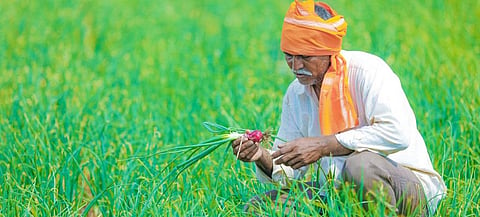

The Punjab and Haryana high court recently recommended that minimum support price (MSP) be made farmers’ legal right and it be set at three times the cost of production. But will these or a slew of other measures the court suggested address the agrarian crisis?
There are many important implications of and concerns regarding the judicial notice, said experts. The court issued these directions while considering the Punjab State Cooperative Agricultural Development Bank’s move to discontinue a pension scheme citing lack of funds owing to loan waivers.
The two-member HC bench of Justices Rajiv Sharma and Harinder Singh Sidhu also took up the all-important issue of non-implementation of Prohibition of Private Money Lending Act, 2007 and that small and marginal farmers are compelled to raise loans from non-institutional sources.
“As far as the agriculture is concerned, the MSP should be three times above the cost of production of major crops to save farmers from distress and also to procure the food grains for public distribution considering the cost including actual expenses in cash and kind, the loan on lease land, impeding the cost of labour, own capital assets, interest on valuable capital etc,” read the HC order.
The MSP, which is being announced since 1965, has failed to boost farmers’ income, said the court. “Time has come when the MSP should be given legal force by granting legal rights to farmers to get fair value for their crops,” the court added.
Also, the HC emphasised that enforcement must not be left with the bureaucratic setup as they “thrive at the cost of poor farmers”. “The state government is directed to device methods to reduce the role of middlemen in procuring food grains,” read the court directive.
These are very welcome and important interventions, but the governments have, till now, failed to give even half of the MSP the court has suggested, say experts.
“Although MSP is announced for 23 crops, including Rabi and Kharif crops and sugarcane, the procurement on MSP is only done for wheat and paddy. If the farmer is given legal cover with regards to MSP, the onus will be on the government to procure all the crops for which MSP is announced,” said Gian Singh, expert in agricultural economics.
Regarding the MSP being three times the cost of production, he said there needs to be a mechanism to contain the disparity over land holdings. The principle that the greater the farm size, the greater the remuneration does not work in favour of small land holders, Singh added.
Moreover, the number of suicides by farmers and farm labourers increased to 12,602 in 2015 from 12,360 in 2014 and 11,772 in 2013, according to National Crime Report Bureau. Of these, 8,007 were farmers in 2015 and 5,650 in 2014. “As of 2018, the Indian government had not published any data on farmer suicides since 2015,” the court observed.
Ensure sustainence
Another issue the court addressed was warehouses. It said there is “no regular chain of warehouses for farmers to store their produce”.
“If the state government builds sufficient number of warehouses, the farmers can store their crops there and can sell it subsequently at remunerative price. The Parliament has enacted the Warehousing (Development and Regulation) Act, 2007 but it has not been implemented in letter and spirit,” said the court while ordering that the Act be implemented.
While calling for the implementation of the Punjab Prohibition of Private Money Lending Act, 2007, the court directed that banks should ensure that no small and marginal farmer, whose land holding is less than five acres, is rendered landless.
The HC asked the Punjab government to consider formulating a scheme for payment of reasonable compensation and family pension to families of farmers who have committed suicide.
It also called for a scheme to provide insurance cover, including weather insurance, to farmers for their crops in consultation with the National Insurance Companies along with stakeholders at minimal premium.
“It needs to be ensured that loans are taken by farmers only from institutional sources. Further, the families of those who have committed suicides need to be given regular financial support,” said Singh.
The HC bench also advised the Reserve Bank of India to frame a scheme on the manner in which agricultural loans are to be advanced, their recovery and waiver.
Both Gian Singh and farmer leader Gobinder Singh of Bharatiya Kisan Union (Ugrahan) said since the compensation is paid to the person in whose name the land is registered in revenue records, agricultural labourers and those farming on contract hardly benefit.
“The government must conduct a survey every six months to ascertain who is tilling the land and who needs to be compensated,” suggested Gobinder Singh, who hails from Mangwal village in Sangrur, which is one of the districts that have seen maximum farmer suicides in Punjab.
“Such interventions, as suggested by the court, have to be made if the farmers are to be saved and the corporatisation of agriculture has to be checked,” added the farmer leader.
The court also suggested that Punjab government develop cyber applications for each and every field to see the status of crop to determine its growth and destruction by natural calamities. These apps, which can be prepared Khasra-wise using satellite imagery, will save time as government and bank officials need not go to the field to verify their status.
“The emphasis must not only be on MSP, an issue that follows many other important recommendations of the MS Swaminathan Committee. The issue of land reforms needs to be visited on priority,” said the expert.